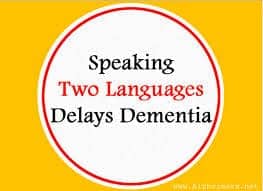Alzheimers and Foreign Language Study
 As articles in National Geographic, NPR, the New York Times and other sources are increasingly reporting, there is a strong link between bilingualism and mental health, specifically where Alzheimers and other forms of dementia are concerned.
As articles in National Geographic, NPR, the New York Times and other sources are increasingly reporting, there is a strong link between bilingualism and mental health, specifically where Alzheimers and other forms of dementia are concerned.
Studies have shown that people who use more than one language in their daily life see the onset of Alzheimers up to five years later than their monolingual peers. Others have reported cognitive and memory test results 3 to 8 times higher for bi- or multilingual subjects, compared to those who speak only one language. Symptoms of mental decline in general are also reported to be far less evident, the evolution of the disease much slower, and the risk of developing Alzheimers at all much lower. “Being bilingual, it turns out, makes you smarter. It can have a profound effect on your brain, improving cognitive skills not related to language and even shielding against dementia in old age.” (NYT)
The reason for these findings is that the brain, when using a second language, is forced to created new neural pathways, or better functional connectivity in the frontal region of the brain, which translates into improved memory, and more complex and rational thinking in brains where Alzheimers is present. “Even if you don’t learn a second language until after middle age, it can still help stave off dementia,” York University’s Ellen Bialystok said. Being “bilingual is one way to keep your brain active—it’s part of the cognitive-reserve approach to brain fitness, and when it comes to exercising the brain by learning another language, the more the better—and every little bit helps.”
 Learning a second or third language isn´t the only way to strengthen your brain and improve memory and other cognitive abilities, although studies show it to be the most effective. Crosswords, Sudoku, word-games, learning a sport or any other new skills, in addition to healthy eating and regular exercise are all factors which can help you retain mental acuity longer than you otherwise might.
Learning a second or third language isn´t the only way to strengthen your brain and improve memory and other cognitive abilities, although studies show it to be the most effective. Crosswords, Sudoku, word-games, learning a sport or any other new skills, in addition to healthy eating and regular exercise are all factors which can help you retain mental acuity longer than you otherwise might.
As the NYT Sunday Review sums it up: “a recent study of 44 elderly Spanish-English bilinguals, scientists led by the neuropsychologist Tamar Gollan of the University of California, San Diego, found that individuals with a higher degree of bilingualism — measured through a comparative evaluation of proficiency in each language — were more resistant than others to the onset of dementia and other symptoms of Alzheimer’s disease: the higher the degree of bilingualism, the later the age of onset.”
Our suggestion? Do an immersion Spanish course at Intercultura, and then find ways to keep coming back! While you are here, you will also have the benefits of eating the healthy and delicious fruits available here, and you will walk to and from school every day from your homestay, providing an essential source of exercise! You will also learn new skills outside of the language course, such as yoga, Latin dance, cooking and arts and crafts. In other words, programs like Intercultura´s can address all the known risk factors and help set you up for a long, healthy and high-functioning life!
Laura E.
Sources:
National Geographic: http://news.nationalgeographic.com/news/2011/02/100218-bilingual-brains-alzheimers-dementia-science-aging/
New York Times (NYT): http://www.nytimes.com/2012/03/18/opinion/sunday/the-benefits-of-bilingualism.html



